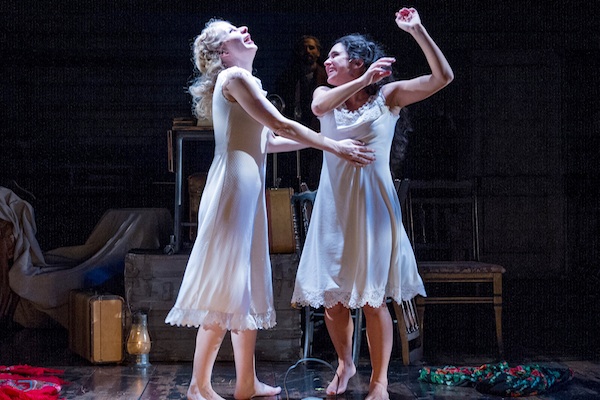
BETTY Comes Home to D.C. Better Than Ever
November 27, 2018
Queering My Christmas Tree
December 1, 2018The Lesbian Kiss that Changed the World: An Interview with ‘Indecent’ Director Eric Rosen
In 1923, the North American run of Sholom Ash’s God of Vengeance came to an abrupt end at the Apollo Theatre on 42nd Street when the entire cast, the producer, and one of the theatre’s owners were indicted for—and later convicted of—obscenity. Set in a brothel, the Yiddish drama portrayed the first lesbian stage kiss on Broadway and called for a Torah to be hurled across the stage.
Ninety-five years later, Paula Vogel’s Indecent recounts the European and American response to God of Vengeance and simultaneously examines the intersection of Jewish and LGBTQ history across both locations before the Holocaust. This fall, the Tony award-winning play will make its Washington-area debut at Arena Stage with Director Eric Rosen at the helm.
In the midst of preparations for opening night, Rosen devoted a few minutes to Tagg to discuss the upcoming production and what it means to show Indecent in today’s political climate.
What is your personal relationship with God of Vengeance?
It’s been about 22 years since I first read God of Vengeance. I was in grad school and, at the time, it was a pretty obscure play—none of my theater professors had ever heard of it. I discovered it on accident as I was reading a different Yiddish theater play in the same anthology. I got to this scene in which two girls kiss in the rain. It’s a beautiful scene. I had to shut the book and check the cover to be sure I was reading a Yiddish play. It was so incongruous of my expectations of what Yiddish theater would have been talking about. At the end of the play, the “tragic” outcome for the girl is that the two girls are “forced” to live together, away from the oppressive father.
I was just blown away. I became kind of obsessed with it. I thought I was the first person in the world to know this play existed. After writing and thinking about it for a while, I heard that Rebecca Taichman, who conceived of and directed the Broadway production of Indecent, was working on her own play about God of Vengeance at Yale while she was in grad school. I was at Northwestern so I thought, “Rebecca has that covered: move on!” And I gave up on it as an as an academic project.
Right after studying God of Vengeance I co-founded About Face Theatre, which is an LGBT theater in Chicago. The excitement I felt reading God of Vengeance fueled a passion to recover our history. At that time—in the early to mid-90s—it was hard to imagine how to claim a queer identity that had been erased — not just from mid-century oppression, but all the way back to the dawn of the era. God of Vengeance gave me a lot of courage to start About Face and turn my career towards working specifically in queer theater.

Eric Rosen, Director of Indecent
Do you still feel as moved by God of Vengeance now?
I feel moved by Paula’s play. God of Vengeance is not producible: it’s very old-fashioned in its form, it requires a huge cast, and no one could afford to produce it anymore. In its time it was extraordinary but I don’t think it’s stood up as a performable piece of dramatic literature—very few plays written in 1906 have! What Paula has created captures the essence of what it was and puts it in this really epic context of a nearly 50-year span from when it was written in 1906 to the coda of the play in 1952. She covers European and American Jewish history and how it is interwoven with LGBT history. As a play, it’s a remarkable achievement.
Does Indecent feel bigger in the current political context? Especially when you consider that you’re producing it in D.C.?
The other day I took a walk over towards the capitol and I saw people walking along just living their lives. Here we are in arguably the most important place in the world, literal steps from where decisions are made that affect billions of people. The idea that we are doing this play right now in this context is very moving, particularly after the synagogue massacre In Pittsburgh and when considering the Pulse nightclub shooting in Florida. The hatred of Jews and queer people is much closer and more personal I think now than when the show opened on Broadway.
We were in rehearsal the day of the synagogue shooting. I looked at my phone and had seven news alerts. We just stopped: we were all so stunned. Since then everything in the play means something different than it did right before.
It seems as you’ve been working on Indecent, it’s just become more and more relevant.
Yes! It’s so trippy. We decided to do the play well over a year ago. People ask if we choose to do this because of the political climate, but the political climate has changed so much in the last year. We were just beginning to understand the contours of what the current administration would be like. Sadly, the play feels more current every day.
For me, doing a play about Jews before the Holocaust is a moral obligation. We must remember that of the people that we’re describing and depicting, their lives were just as unpredictable as ours. The events they encountered were just as real and fresh to them as the events we encounter now. After a historical tragedy, we tend to think that tragedy was inevitable, like any Jew who didn’t know to get out of Europe should have known better. But that’s not how the world works. Bad things happen and you have no idea they’re happening, even if–in retrospect–it’s obvious. But it’s not obvious right now to us. Can you imagine what our children will think of our inaction about climate change? They won’t know about Trump or the politics of coal – they will look at us and wonder why, despite the warnings, we didn’t do anything. The people that lived 100 years ago knew just as little and as much about the future as we know now.
There’s no way we could have predicted how relevant Indecent would be. In a way, our job is to keep the audience from thinking about that. You shouldn’t really notice that this play is deeply political until after the show when you’re discussing it at a bar. Our job is to help you get lost in a great story, to present something entertaining and moving and alive, and let the audience discover meaning for themselves.
What do you hope the audience takes away from Indecent?
I take a tremendous amount of pride in being a gay Jewish man and I’m very grateful for the years I’ve been able to spend as an activist voice in the theater for the advancement of LGBT rights, visibility, and equality. The knowledge that–in our history as both Jews and/or people in the LGBT community–there was this radical, crazy play from 1906, that in 1923 changed the world – that is so powerful! In our history, the representation of a kiss between two women literally changed the world.
I think that’s an important reminder for us that we, as people–people of color, people of different gender expressions, people of different sexualities, faiths, races, and ethnicities–have the ability to represent the truth of our lives in a way that causes the world to spin differently, simply by telling our truth. We know that theatre is tremendously powerful, we’ve seen examples of what it can do within our culture – think about Hamilton and Angels in America and Rent and on and on. It’s amazing to remember that it happened before, in a different way, a hundred years ago.
We’re aren’t the first people to feel exceptionally free as queer people. We aren’t the first people to feel exceptionally free as Jewish people. There were people before us and there will be people after us who feel oppressed and liberated. While that’s very frightening, it’s also very moving to appreciate our relative position of power in the present moment and to know we have an obligation to protect the future for our children and their children.
Indecent will run at the Area Stage in Washington, D.C. through December 30, 2018. Tickets and additional information about the production are available at www.arenastage.org.





